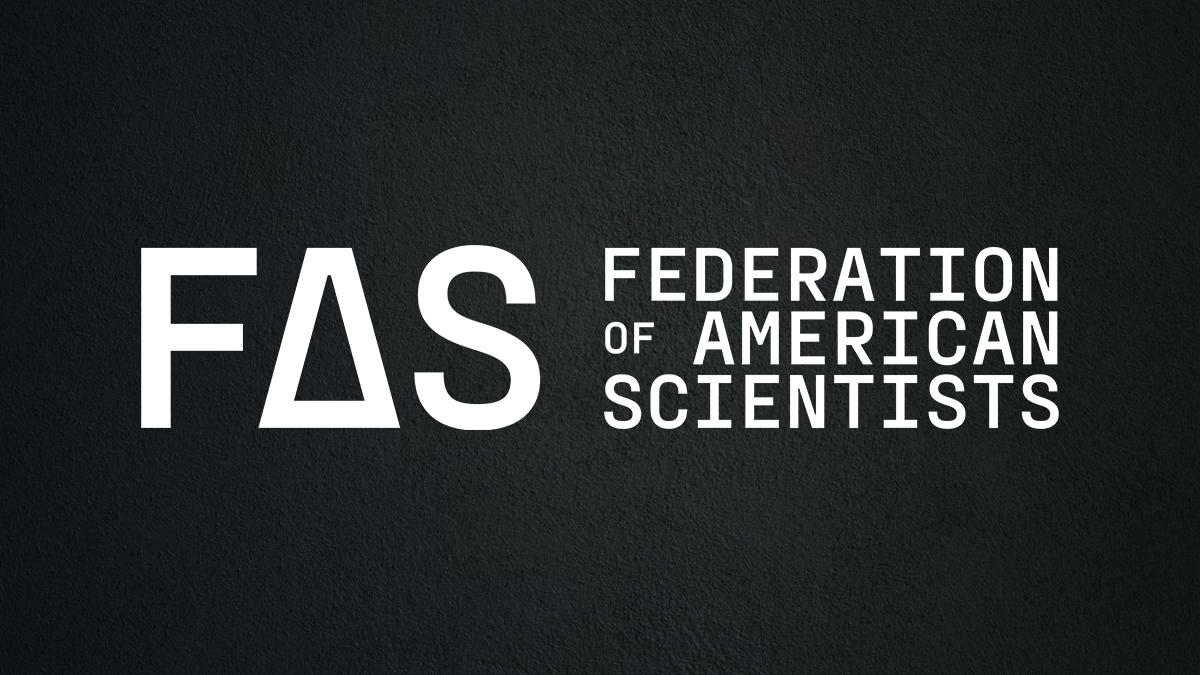
Nuclear Notebook: Russian Nuclear Weapons 2025 Federation of American Scientists Unveils Comprehensive Analysis of Russia’s Nuclear Arsenal
Washington, D.C. – May 6, 2025 – The Federation of American Scientists (FAS) today released “Nuclear Notebook: Russian Nuclear Weapons 2025,” its authoritative annual survey of Russia’s nuclear weapons arsenal. The FAS Nuclear Notebook is considered the most reliable public source for information on global nuclear arsenals for all nine nuclear-armed states. FAS has played a critical role for almost 80 years to increase transparency and accountability over the world’s nuclear arsenals and to support policies that reduce the numbers and risks of their use.
This year’s report, published in the Bulletin of the Atomic Scientists and by Taylor & Francis and available in full here, discusses the following takeaways:
- Russia currently maintains nearly 5,460 nuclear warheads, with an estimated 1,718 deployed. This represents a slight decrease in total warheads from previous years but still positions Russia as the world’s largest nuclear power alongside the United States.
- Russia continues to modernize its nuclear triad, replacing Soviet-era weapons with newer types, but modernization of ICBMs and strategic bombers has been slow. The country’s efforts to develop the advanced Sarmat (RS-28 or SS-29) ICBM and the next-generation strategic bomber, PAK DA, have faced delays and setbacks.
- The submarine-based nuclear force continues its modernization with Borei-class submarines replacing older types. A portion of Russian ballistic missile submarines are at sea at any given time on strategic deterrent patrols. Significant nuclear warhead and missile storage upgrades are underway at the Pacific and Northern fleet bases.
- Russia continues modernizing and emphasizing its nonstrategic nuclear forces. This includes land- and sea-based dual-capable missiles and tactical aircraft. Despite modernization of launchers, the number of warheads assigned to those launchers has remained relatively stable. Russia held several high-profile exercises with its nonstrategic forces in 2024, and the authors describe upgrades to a suspected nuclear storage depot in Belarus.
- Russia has maintained its policy of nuclear deterrence, emphasizing the strategic importance of its nuclear arsenal in its military doctrine. Updates to public policy documents describe a broader range of scenarios for potential use of nuclear weapons but it is unknown to what extent this is reflected in changes to military plans.
FAS Nuclear Experts and Previous Issues of Nuclear Notebook
The FAS Nuclear Notebook, co-authored by Hans M. Kristensen, Matt Korda, Eliana Johns, and Mackenzie Knight, is published bi-monthly in the Bulletin of the Atomic Scientists. The first Nuclear Notebook was published in 1987. FAS, formed in 1945 by the scientists who developed the first U.S. nuclear weapon, has worked since to increase nuclear transparency, reduce nuclear risks, and advocate for responsible reductions of nuclear arsenal and their role.
This latest issue on Russia’s nuclear weapons comes after the release of Nuclear Notebook: Chinese Nuclear Weapons 2025 and will be followed in June by Nuclear Notebook: French Nuclear Weapons 2025. More research available at FAS’s Nuclear Information Project.
The Federation of American Scientists’ work on nuclear transparency would not be possible without generous support from the Carnegie Corporation of New York, the Joseph Rowntree Charitable Trust, the Jubitz Family Foundation, the New-Land Foundation, Ploughshares, the Prospect Hill Foundation, and individual donors.
###
ABOUT FAS
The Federation of American Scientists (FAS) works to advance progress on a broad suite of contemporary issues where science, technology, and innovation policy can deliver transformative impact, and seeks to ensure that scientific and technical expertise have a seat at the policymaking table. Established in 1945 by scientists in response to the atomic bomb, FAS continues to bring scientific rigor and analysis to address contemporary challenges. More information about FAS work at fas.org.
The last remaining agreement limiting U.S. and Russian nuclear weapons has now expired. For the first time since 1972, there is no treaty-bound cap on strategic nuclear weapons.
The Pentagon’s new report provides additional context and useful perspectives on events in China that took place over the past year.
Successful NC3 modernization must do more than update hardware and software: it must integrate emerging technologies in ways that enhance resilience, ensure meaningful human control, and preserve strategic stability.
The FY2026 National Defense Authorization Act (NDAA) paints a picture of a Congress that is working to both protect and accelerate nuclear modernization programs while simultaneously lacking trust in the Pentagon and the Department of Energy to execute them.